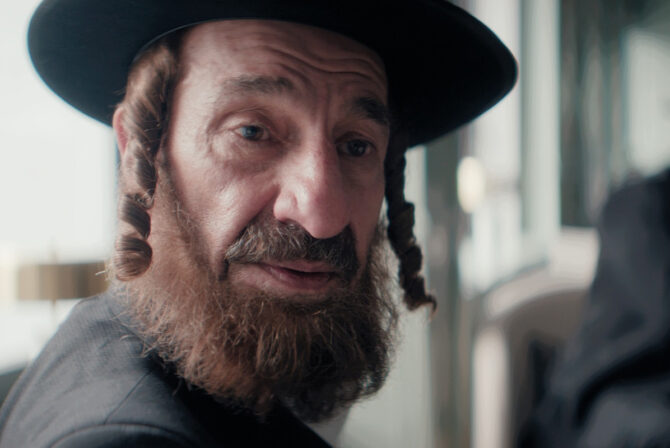This article is part of the Here. Now. essay series, which seeks to de-stigmatize mental health treatment, and improve accessibility to treatment and support for teens and parents in metropolitan New York.
This autumn, I found myself in an emergency room, cursing out a social worker, ranting about being in “the matrix.”
Insisting that the E.R. had been cleared of all real patients and was filled with actors whose sole purpose was to teach me a lesson, as punishment for my sins.
Convinced that I was a sociopath whose callous negligence caused the deaths of many patients at the hospital where I worked.
Sobbing that someone was going to kidnap and murder my baby son in vengeance.
Begging my husband to rescue my laptop before someone could delete all pictures of our infant and erase evidence of his existence.
Tying a noose out of towels in the shower—not with any intention of using it, but merely constructed in a fit of pique after perceiving that the entire hospital staff had conspired to mess with me.
Scribbling conspiracy theories madly in my journal in purple crayon after the hospital staff denied me use of a pen for my own safety, after the noose incident.
It didn’t help that this all took place on the Shabbat between Rosh Hashanah and Yom Kippur—smack in the middle of the Ten Days of Repentance, when Jews are supposed to ask one another for forgiveness. I believed that my entire synagogue community hated me, and had plotted to test whether I would repent to them all before Yom Kippur.
All of this must have been unrecognizable from the cheerful, calm, capable image I normally presented to the world. The past year was one of milestones and changes: new Ph.D., new house in the suburbs, new synagogue and new role as vice-president of the synagogue board, new school for my kids, new baby, and, most recently, new job as a clinical psychologist for military cancer patients. At age 32, I had everything I wanted in life: a loving husband, three healthy children, a large network of friends and family, financial stability, a beautiful house, a close-knit synagogue community led by an exceptionally warm rabbinic family, and a rewarding if emotionally demanding job. I was one of those women whose life looks annoyingly perfect on Facebook.
And yet, back in August, depression began to cloud my mind, like a fog that rolled in gradually until it was so thick I could not see anything ahead of me or behind. It started at work. I was consumed with self-doubt and crippled by impostor syndrome. Doctors and nurses were looking to me to help their despairing patients, and I—a brand new psychologist right out of graduate school—had no idea how to help them. My brain felt sluggish and clogged. I lost my appetite. I slept a fitful three hours a night, and awoke full of dread.
I recognized the signs because I had experienced depression twice before: at the beginning of my freshman year at Harvard, and then at the start of my “real adult life” after college. It had been a decade since the second episode, and in the intervening years I had tried to pretend that neither ever happened; even mental health providers are susceptible to the stigma.
The first episode resolved fairly quickly with medication, and I chalked it up to transition-to-college stress. The second I muscled through without any treatment—partly because I didn’t know how to seek mental health help in the “real world,” and partly because I didn’t want to admit I had a recurrent illness. If I didn’t seek treatment, then I wouldn’t receive a diagnosis, and my depression wouldn’t really exist.
This time I couldn’t afford to deny it. I had three children aged 5 and under, and a caseload of severely ill patients. Luckily, by now I was armed with personal and professional knowledge about depression, as well as a decade more life experience, so I knew what to do. I found a psychiatrist and a therapist. I got on medication. I asked for some time off work. I told my parents, husband, and a few friends what was going on.
But weeks passed, and the depression wasn’t getting any better. Instead it was getting worse. Whereas at first the symptoms lifted each evening and weekend, when I was home with my family, now they became constant. There was no escape. I forgot what it was like not to be depressed, and couldn’t believe that a non-depressed version of me ever existed or would ever return. Knowing the harmful effects of maternal depression on young children, especially infants, I became convinced that I was irreparably damaging my children every passing day. I began to feel more desperate.
Then something broke through, just ahead of Rosh Hashanah.
At an outdoor Selichot service under the stars, I heard my rabbi’s message about repentance, and believed he was speaking directly to me. One week later at synagogue on Shabbat morning, every single interaction with my fellow community members seemed laden with sarcastic, hateful meaning. My head buzzed as I looked around the room at kiddush and felt that every single person was talking about me. It was like a living nightmare—where everywhere you turn, someone is trying to hurt you, and you cannot escape.
I told my husband about our community’s plot against me. He called my therapist, who told him that my depression turned into a psychotic depression, and advised him to take me straight to the E.R. I acquiesced, if only out of desperation to escape.
I spent the next 48 hours in the E.R., spinning wilder and wilder conspiracy theories. My room and the E.R. hallway were full of hidden “clues,” which I tried to point out to my husband, increasingly frustrated as he countered each one with a logical alternative explanation.
He begged me to do whatever my doctors recommended. Seeing his pain, I agreed to a voluntary inpatient admission. I adamantly denied that I was psychotic, but I knew something was terribly wrong and I needed help.
Over 12 days in the hospital, my brain began to heal. I took a sedating anti-psychotic medication each night, which helped me escape into 11 hours of deep sleep. I ate three square meals a day and regained 12 pounds I’d lost while depressed. I attended art therapy and group therapy and “movement therapy,” which involved stretches led by an art therapy graduate student in a pencil skirt. I even let a doctor from OB/GYN come and remove an IUD I’d gotten in July; I didn’t understand the rationale, but my psychiatrist recommended it, and I kept my promise to my husband that I would comply.
Family visited every day: I colored with my kids, played board games with my siblings, and ate my mother’s home-cooked holiday meals that she lovingly sent with my siblings in Ziploc containers, thoughtfully including everything from challah to soup to my favorite Sukkot dessert, buckeyes. Behind the scenes, my father—a professor at the university affiliated with the hospital—made every phone call he could to ensure I got the best possible psychiatric care.
Slowly, the delusions began to disappear. Every day my psychiatrist ran down my list of symptoms and the answers gradually changed. No, I was not in the matrix anymore. No, the other patients were not delivering hidden messages to me. No, I didn’t believe that my psychiatrist was part of any plot. These answers were all true. What I withheld was that I still believed there was some sort of plot at the synagogue. Whatever happened that day felt so real, surely there was something to it.
“What about that feeling of emptiness?”
I still felt empty inside. Each morning in the hospital, I awoke with the same sense of dread and despair that had plagued me since August. Wishing I had not woken up. Believing there was nowhere in the world where I belonged. If even here, in a psych ward, I could not escape the demons of my brain, where else could I possibly go?
“Look,” I finally told my doctor. “I’ve healed as much as I can here. This void isn’t going to get filled in the hospital. It has to happen on the outside.” She agreed to discharge me after a few more days. My family was relieved to hear I would be coming home. My last night in the hospital, the rabbi visited. I greeted him warily.
I left the hospital no longer floridly psychotic, but still very depressed and suspicious. The thought of facing anyone from my synagogue community made me terribly anxious. But 12 days in the hospital taught me that you can’t escape the things you fear. The best way out is always through, said Robert Frost.
Two nights after my discharge, the rabbi and his wife hosted a Sukkot sing-along under the stars at their home. It seemed like the best way to dip my toe into re-entering the community—it would be dark, we would be singing, I wouldn’t have to make awkward conversation with anyone. At my husband’s request, and with my permission, an email had gone out to the community explaining that I was hospitalized with psychiatric symptoms and that he needed help with meals and bedtimes. Who knew what they thought of me now. But the best way out is always through.
As soon as I arrived, I could feel the warmth and genuine care of my rabbi and his wife. And I felt it from the other members of the synagogue, too. At that point I knew for certain that these were not people who wanted to hurt me. Under the stars, that gathering performed what drugs and psychiatrists could not: It cleared the last vestiges of not just psychosis, but depression, from my brain. Whatever I perceived had happened at synagogue that other day wasn’t real; this was real. I felt my heart fill with a deep sense of love, connection, and gratitude to them all. I belonged right here, with my family and community.
I knew I felt different. What I didn’t know was why—or rather, why I’d ever felt that other way at all. That week, I asked my psychiatrist for the first time what happened to me. “I’m going with the freak storm model,” she answered. “You stopped nursing, you got an IUD, and you’re within the postpartum year, so your hormones were on fire. You started a stressful new job, you got depressed, you weren’t sleeping for a month—and sleep deprivation can make anyone psychotic. All that together pushed you over the edge.”
So it seems there is a hormonal and biochemical explanation for my symptoms and a medical explanation for my recovery. And yet, there is more. I felt as if my soul—something I only noticed in its absence—had been gone for the entire duration of my depression, and especially during those last few weeks of psychosis. And now it had been returned to me.

This post is part of the Here.Now series, which seeks to destigmatize mental health,
and is made possible by UJA-Federation of New York and The Jewish Board.
Visit www.ProjectHereNow.org for more.







